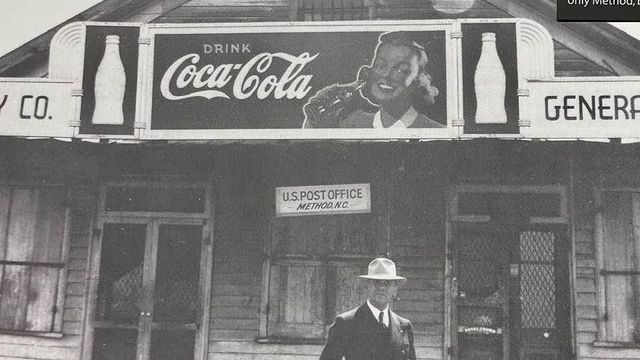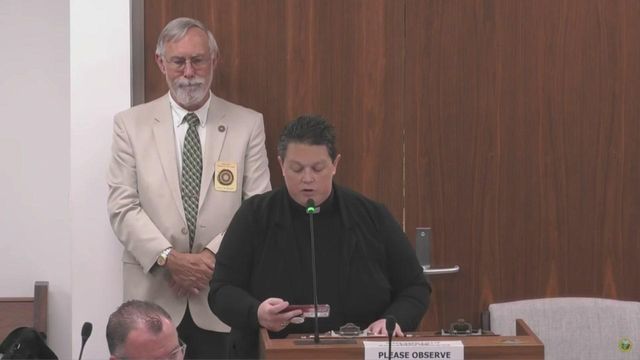Raleigh park hides century-old remains of segregated high school
At first glance, Method Community Park looks like any other playground – with slides and swings and shade trees. You may not realize you're standing in the footprint of a century-old school campus that served the Black community during the segregation era in Raleigh.
There are only two remaining structures from the original Berry O'Kelly Training School campus standing in the park today – the 1926 Agriculture Building and the 1959 Gymnasium. If you wander the park, you'll also notice an 1800s Gothic-Revival church and a grave and memorial for Berry O' Kelly, who donated the land for the school in 1894.

In the early 1900s, students came to this school from all across Wake County – traveling from Apex, Fuquay and Zebulon to the small community of Method, where the school stood.
Just like the school itself, much of the original Method community has also been lost to history.
But there are still people who remember the history of the school and the surrounding community – and they're fighting to keep it alive.

Method: One of Raleigh's only remaining Freedmen's Villages
Established in 1872 by Black men and women freed from slavery, Method was one of 13 Freedmen's Villages built around Raleigh. These communities were built by men and women freed from slavery in the aftermath of the Civil War.
After emancipation, over 4,000 'freedmen' came to Raleigh, many of who were starting out life in freedom with no jobs, no homes and no money. These citizens made up around half of the city's entire population. They pulled together to build homes, churches, schools and businesses.
Of the 13 villages formed during this time, only Oberlin Village and Method remain today.
The Method community still stands in southwest Raleigh, although some of its historic buildings have been lost. Established in the 1870s by half-brothers Jesse Mason and Isaac O'Kelly, it consisted of nearly 70 acres of land bought from a Confederate General named William Ruffin Cox.

The brothers sold parcels to other men and women who had been freed from nearby plantations.
The area was sometimes called Planktown, Slab Town, and Save-Rent -- a reference to the simple log homes built with 'planks' or 'slabs,' according to the Raleigh Historic website. Hand-built by the citizens themselves, none of these original homes survived.
Preserving Black History in Method
After Raleigh annexed Method, some of the historic structures and homes were lost. However, there are some who remember going to school at Berry O' Kelly, who have pushed to ensure history isn't forgotten.
Today, located just off Beryl and Method Road, many recognize the Method Post Office. John O Goode, Sr., a former student who graduated from Berry O' Kelly in 1964, remembers when a different establishment graced this location: The Berry O' Kelly Store.

“The store it was the treat," he recalls. "That was our 7/11. We had everything in that store.”
The store's owner, Berry O’Kelly, was a wealthy and influential Black businessman, who owned farmland, properties and investments. Besides operating the largest store in the surrounding area, O'Kelly was Method's first postmaster, and he was elected into multiple influential positions. It was a donation from O'Kelly that first allowed the creation of the Berry O'Kelly Training School.
His store served as the gateway to the Method Community.

Remembering the Berry O'Kelly Training School
During a time when schools were segregated, and many Black students weren't given equal access to quality education, the Berry O' Kelly Training School was known was "the finest and most practical rural training school in the entire South."
In 1919, the Berry O'Kelly Training School became the first fully accredited rural high school for Black students in the entire state.

Today, one of the school's remaining buildings has a museum of vintage photos and history.
It's a place where the next generation can catch a glimpse of days gone by – and where former students like John O Goode can find pictures of his days at Berry O' Kelly.
"Whose that guy back there?" he said, pointing at a photo. "See how studious we were doing our work?"
Dorothy A. Freeman Lewis, another former student, said the teachers were talented and caring, and the school felt like a safe place from the segregation of the world outside.
"You knew the teachers cared for you even though they accepted no nonsense, and you are safe," she said. "I didn’t feel 'less than,' because we were not treated as less than by our teachers. We were sheltered from a lot of that.

These walls shaped leaders like Goode, who retired after 30 years in the Air Force, and Freeman Lewis, who broke ground as the first African American woman framing foreman at New Jersey Bell, which later became Verizon.
After the school closed in 1966, all but two original buildings were torn down.
“When I came back home, I was saddened to see our high school gone," recalled Goode.
To ensure his beloved school would not be erased from history, Goode helped form a group called Method Boys to Men. The group meets each week to discuss the history of their community and provide food baskets for those in need.

They also care for the grounds at OakGrove Cemetery, where many of the founding families of the Method community are buried.
"It makes you feel good. Looking at the grounds here? Very good we get out here and have a good time everything is good," said former student Albert Crenshaw Jr., who graduated in 1964.
Several times a year, local students have the unique opportunity to visit one of the last-standing historically protected buildings from the Berry O'Kelly school.
During these visits students from Cardinal Gibbons learn the rich history of the community, tour the grounds and listen to stories and memories from Goode and Freeman-Lewis. They've ensured the story of Method will be told to the next generation.
Podcast: Preserving the history of the Method Community
WRAL's Julian Grace shares his experience talking to former students and learning about the Method Community in our latest podcast. Take a listen!












